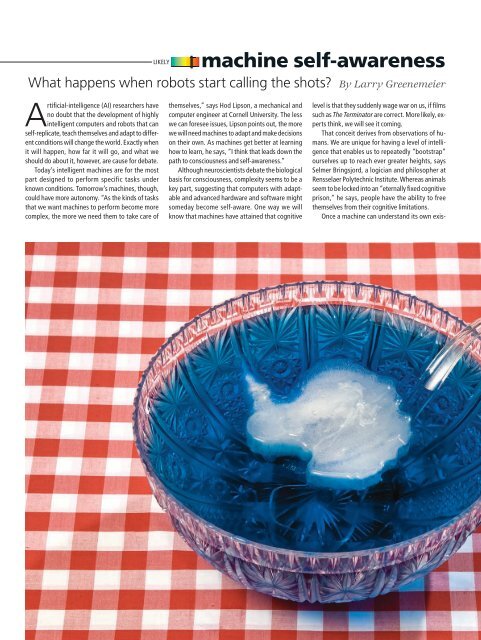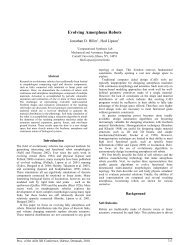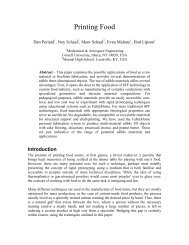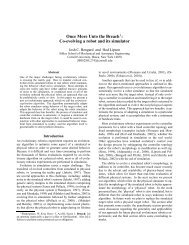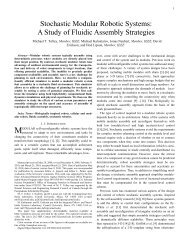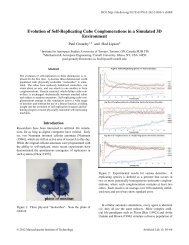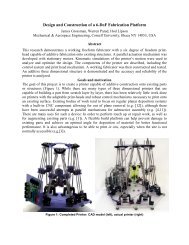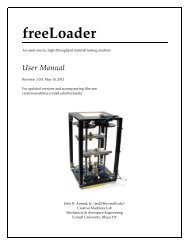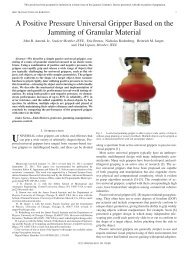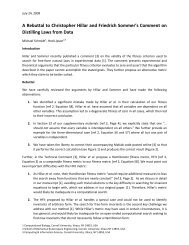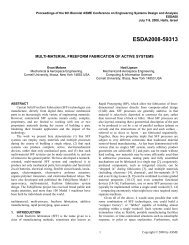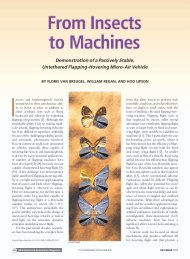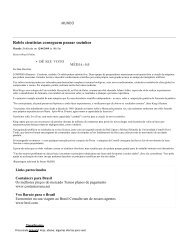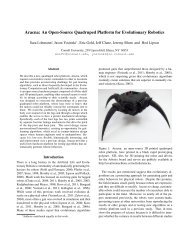machine self-awareness - Cornell Creative Machines Lab - Cornell ...
machine self-awareness - Cornell Creative Machines Lab - Cornell ...
machine self-awareness - Cornell Creative Machines Lab - Cornell ...
You also want an ePaper? Increase the reach of your titles
YUMPU automatically turns print PDFs into web optimized ePapers that Google loves.
Arti cial-intelligence (AI) researchers have<br />
no doubt that the development of highly<br />
intelligent computers and robots that can<br />
<strong>self</strong>-replicate, teach themselves and adapt to different<br />
conditions will change the world. Exactly when<br />
it will happen, how far it will go, and what we<br />
should do about it, however, are cause for debate.<br />
Today’s intelligent <strong>machine</strong>s are for the most<br />
part designed to perform specific tasks under<br />
known conditions. Tomorrow’s <strong>machine</strong>s, though,<br />
could have more autonomy. “As the kinds of tasks<br />
that we want <strong>machine</strong>s to perform become more<br />
complex, the more we need them to take care of<br />
LIKELY<br />
<strong>machine</strong> <strong>self</strong>-<strong>awareness</strong><br />
What happens when robots start calling the shots? By Larry Greenemeier<br />
themselves,” says Hod Lipson, a mechanical and<br />
computer engineer at <strong>Cornell</strong> University. The less<br />
we can foresee issues, Lipson points out, the more<br />
we will need <strong>machine</strong>s to adapt and make decisions<br />
on their own. As <strong>machine</strong>s get better at learning<br />
how to learn, he says, “I think that leads down the<br />
path to consciousness and <strong>self</strong>-<strong>awareness</strong>.”<br />
Although neuroscientists debate the biological<br />
basis for consciousness, complexity seems to be a<br />
key part, suggesting that computers with adaptable<br />
and advanced hardware and software might<br />
someday become <strong>self</strong>-aware. One way we will<br />
know that <strong>machine</strong>s have attained that cognitive<br />
level is that they suddenly wage war on us, if lms<br />
such as The Terminator are correct. More likely, experts<br />
think, we will see it coming.<br />
That conceit derives from observations of humans.<br />
We are unique for having a level of intelligence<br />
that enables us to repeatedly “bootstrap”<br />
ourselves up to reach ever greater heights, says<br />
Selmer Bringsjord, a logician and philosopher at<br />
Rensselaer Polytechnic Institute. Whereas animals<br />
seem to be locked into an “eternally xed cognitive<br />
prison,” he says, people have the ability to free<br />
themselves from their cognitive limitations.<br />
Once a <strong>machine</strong> can understand its own exis
tence and construction, it can design an improvement<br />
for it<strong>self</strong>. “That’s going to be a really slippery<br />
slope,” says Will Wright, creator of the Sims games<br />
and co-founder of Berkeley, Calif.–based robotics<br />
workshop the Stupid Fun Club. When <strong>machine</strong> <strong>self</strong><strong>awareness</strong><br />
rst occurs, it will be followed by <strong>self</strong>improvement,<br />
which is a “critical measurement of<br />
when things get interesting,” he adds. Improvements<br />
would be made in subsequent generations,<br />
which, for <strong>machine</strong>s can pass in only a few hours.<br />
In other words, Wright notes, <strong>self</strong>-<strong>awareness</strong><br />
leads to <strong>self</strong>-replication leads to better <strong>machine</strong>s<br />
made without humans involved. “Personally, I’ve<br />
always been more scared of this scenario than a lot<br />
of others” in regard to the fate of humanity, he<br />
says. “This could happen in our lifetime. And once<br />
we’re sharing the planet with some form of superintelligence,<br />
all bets are off.”<br />
Not everyone is so pessimistic. After all, <strong>machine</strong>s<br />
follow the logic of their programming, and<br />
if this programming is done properly, Bringsjord<br />
says, “the <strong>machine</strong> isn’t going to get some supernatural<br />
power.” One area of concern, he notes,<br />
would be the introduction of enhanced <strong>machine</strong><br />
intelligence to a weapon or ghting <strong>machine</strong> behind<br />
the scenes, where no one can keep tabs on it.<br />
Other than that, “I would say we could control the<br />
future” by responsible uses of AI, Bringsjord says.<br />
This emergence of more intelligent AI won’t<br />
come on “like an alien invasion of <strong>machine</strong>s to replace<br />
us,” agrees futurist and prominent author<br />
Ray Kurzweil. <strong>Machines</strong>, he says, will follow a path<br />
that mirrors the evolution of humans. Ultimately,<br />
however, <strong>self</strong>-aware, <strong>self</strong>-improving <strong>machine</strong>s will<br />
evolve beyond humans’ ability to control or even<br />
understand them, he adds.<br />
polar meltdown<br />
The U.S. is shrinking—physically. It<br />
has lost nearly 20 meters of beach<br />
from its East Coast during the 20th<br />
century. The oceans have risen by roughly<br />
17 centimeters since 1900 through expansion<br />
(warmer water taking up more space)<br />
and the ongoing meltdown of polar ice.<br />
That increase, however, is a small fraction<br />
compared with what’s to come. “Plan<br />
for one meter by the end of this century,”<br />
says glaciologist Robert Bindschadler, an<br />
emeritus scientist at NASA. “The heat in<br />
the ocean is killing the ice sheet.”<br />
Some of the famous predictions—Florida<br />
under ve meters of sea-level rise and<br />
a gaping bay where Bangladesh used to<br />
be—may be centuries away. But expect an<br />
ice-free Arctic and different coastal contours<br />
by 2100. By the reckoning of economist<br />
Nicholas Stern of the London School<br />
of Economics, 200 million people live<br />
within one meter above the present sea<br />
level, including eight out of 10 of the<br />
world’s largest cities and all the megacities<br />
of the developing world. “They’re going to<br />
have to move,” Bindschadler suggests.<br />
In fact, unless greenhouse gas emissions<br />
are tamed, the seas will keep rising<br />
as the ice sheets covering mountain ranges<br />
The legal implications of <strong>machine</strong>s that operate<br />
outside of humanity’s control are unclear, so “it’s<br />
probably a good idea to think about these things,”<br />
Lipson says. Ethical rules such as the late Isaac Asimov’s<br />
“three laws of ro bot ics”—which, essentially,<br />
hold that a robot may not injure a human or allow<br />
a human to be injured—become dif cult to<br />
obey once robots begin programming one another,<br />
removing human input. Asimov’s laws “assume<br />
that you program the robot,” Lipson says.<br />
Others, however, wonder if people should even<br />
govern this new breed of AI. “Who says that evolution<br />
isn’t supposed to go this way?” Wright asks.<br />
“Should the dinosaurs have legislated that the<br />
mammals not grow bigger and take over more of<br />
the planet?” If control turns out to be impossible,<br />
let’s hope we can peaceably share the planet with<br />
our silicon-based companions.<br />
LIKELY<br />
Move the beach chair back: rising seas<br />
will literally reshape the world By David Biello<br />
(constituting roughly 1 percent of the<br />
planet’s ice), Greenland (9 percent) and<br />
Antarctica (90 percent) melt away. All<br />
told, they harbor enough water to eventually<br />
raise sea levels by at least 65 meters.<br />
It takes centuries to melt an entire ice<br />
sheet, but still, the ice is disappearing faster<br />
than scientists had expected even a few<br />
years ago. Even with gradual sea-level rise,<br />
the risk of catastrophic storm surges and<br />
the like creeps up.<br />
The gravitational pull of ice on surrounding<br />
waters is a recently appreciated<br />
surprise, too: generally speaking, if Greenland<br />
ice melts, “most of the sea-level rise<br />
occurs in the Southern Hemisphere,” and<br />
vice versa for Antarctic ice, says physicist<br />
W. Richard Peltier of the University of Toronto.<br />
“West Antarctica is the region we<br />
believe is most susceptible to destabilization<br />
by ongoing global warming.”<br />
Even if greenhouse gas emissions decline,<br />
the polar meltdowns will be dif cult<br />
to avoid because ice sheets lag the overall<br />
climate and, once melted, have a hard time<br />
re-forming. Just how humans will adapt<br />
to a more watery world is still not known.<br />
Of today’s trend, Bindschadler notes,<br />
“We’re not going to avoid this one.”<br />
SCIENTIFIC AMERICAN 45


